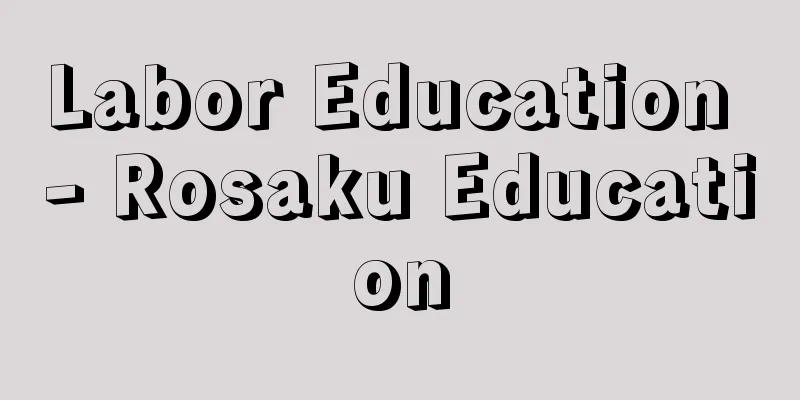Labor Education - Rosaku Education

|
In contrast to the book-centered, conceptual education of the 19th century, this education values active productive work experiences, and aims to promote the unified development of children's knowledge and morality, especially through handicraft activities. It is also called occupational education, labor education, or work education. It is desirable for labor to be combined with children's interests and concerns, but labor alone cannot be distinguished from play, and labor cannot be said to have educational value. Labor experiences can be educational when they are incorporated into intentional educational activities as preparatory experiences for intellectual and moral maturity. The idea of work education originated from Rousseau, Pestalozzi, and Froebel, who placed importance on children's self-activity. Pestalozzi and Froebel aimed to have children experience the joy of work, especially through handicraft production activities, and thereby to develop children's active and holistic development. This idea of self-activity was developed further by J. Dewey, G. Kerschensteiner, and P. Blonskij (1884-1941) in the midst of the changes in the industrial structure and new educational movements of the 20th century. Dewey placed importance on empirical understanding of modern society through work as a method of problem-solving learning, while Blonski considered work education as socialist productive labor. However, the idea of work education was systematically developed by Kerschensteiner. He advocated the upbringing of competent citizens by combining school education and productive labor. He believed that the desired development of children's minds would be achieved by unconditionally subjecting their will to the laws of things. This philosophy had a major impact on the Japanese education world in the past, and is still being reevaluated today. [Tashiro Naohiro] "Kerschensteiner - An Introduction to Educational Theory" by Mitsunaga Otani (1976, Horitsu Bunkasha) [Reference] |Source: Shogakukan Encyclopedia Nipponica About Encyclopedia Nipponica Information | Legend |
|
19世紀の書物中心の観念的な教育に対し、能動的な生産作業体験を重んじ、とくに手工的活動を通して子供の知識と道徳性の統一的発達を目ざそうとする教育をいう。作業教育、勤労教育、労働教育とよばれることもある。労作は子供の興味・関心と結合されることが望ましいが、それだけでは遊びとの区別がつかず、労作が教育的価値をもつとはいえない。労作体験が知的・道徳的成熟の準備体験として意図的教育活動に組み込まれるときに、労作は教育的になりうる。 労作教育の思想は、子供の自己活動を重視したルソー、ペスタロッチ、フレーベルに源流をもつ。ペスタロッチやフレーベルは、とくに手工的制作活動を通じて労作の喜びを子供に体験させ、それによって子供の活動的・全人的発達を目ざした。この自己活動の思想は、20世紀の産業構造の変化と新しい教育運動の流れのなかで、J・デューイ、G・ケルシェンシュタイナー、P・ブロンスキーBlonskij(1884―1941)らによって発展させられた。デューイは問題解決学習の方法としての作業を通して、経験的な現代社会の理解を重視し、ブロンスキーは社会主義的生産労働として労作教育を考えた。しかし、労作教育の思想は、ケルシェンシュタイナーにより体系的に展開される。彼は学校教育と生産労働を結合させることによって、有能な公民の育成を主張した。その際子供の意志を事柄の法則に無条件に従わせることによって、子供の心意の望ましい発達が達成されると考えている。その思想は過去に日本の教育界に大きな影響を与えたが、今日もその再評価が行われている。 [田代尚弘] 『大谷光長著『ケルシェンシュタイナー――教育学序説』(1976・法律文化社)』 [参照項目] |出典 小学館 日本大百科全書(ニッポニカ)日本大百科全書(ニッポニカ)について 情報 | 凡例 |
<<: Old man's travels - Rozan Yuuki
Recommend
Vidocq, François Eugène
Born: July 24, 1775 in Arras [Died] May 11, 1857. ...
Dutch Telescope
… [Inventions and Developments] The telescope was...
Thomson, R.
…The Times's authority as a ruling class news...
phellem
… In Japan, all of the amount used is imported fr...
Inshu Gasenshi
…In the Edo period, the preference for Chinese ca...
Plum blossoms in the snow
A novel by Suehiro Tetsucho. Published in 1886. In...
Educational assistance - Kyoikufujo
Educational assistance is one of eight types of p...
Okamoto (English) OKAMOTO CORPORATION
Official company name: "Okamoto Kabushiki Gai...
Slovenia - Republic of Slovenia (English spelling)
It was one of the six republics that made up the ...
Pisces (the Fish)
Abbreviation Psc. One of the zodiacal constellatio...
Um Rashrash (English spelling)
…After the Crusades, it flourished as a trade hub...
Tail dragging
Another name for the Minohiki Chabo, a chicken tha...
Kimoto-so - Kinomoto-no-sho
...The lord of the manor would prepare the ponds ...
Caltex [company] - Caltex
A major American oil company engaged in refining c...
Watershed - Bunsuikai
The boundary between adjacent river basins. River...






![Tamari [village] - Tamari](/upload/images/67cc2652cb512.webp)


